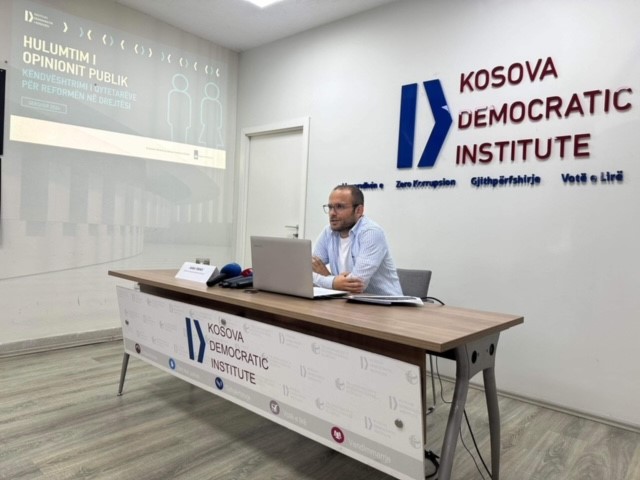


PRESS CONFERENCE 26.06.2024
Today, KDI published the results of the latest citizen survey, revealing their views on the progress of the Judicial Reform. The conference also highlighted findings from KDI’s latest report, which provides an overall assessment of the judicial reform dynamics during these three and a half years of the Kurti Government.
The report assesses that the Justice Reform—one of the main priorities of the Kurti Government—though materialized in several significant legal initiatives, has not been completed and has failed to meet citizens’ expectations for a more effective judiciary and more efficient handling of corruption cases.
The lack of clarity and political consensus on the content of the reform, numerous controversies between the government and heads of justice institutions regarding legislative changes, and doubts about the constitutionality of laws affected by the Reform have accompanied the process from the beginning. Despite the active involvement of civil society organizations in all discussion platforms, their influence on decision-making was very limited due to the dominance of the government’s perspective in the legislative process. Ultimately, the lack of public information regarding the content of the reform and the opportunities for public involvement in the process were evident in almost all surveys conducted by KDI over two years, highlighting the necessity for more open and substantive communication by the Government with citizens about the practical effects intended by this Reform.
The report focused on evaluating the main pillars of the Reform, such as Vetting for the heads of justice institutions, reforms in the Prosecutorial Council, and the Draft Law on the State Bureau for Verification and Confiscation of Unjustified Assets of public officials. According to KDI, the Government needs to come up with an alternative for implementing Vetting since the approval of constitutional amendments requires the votes of the Serbian List. On the other hand, the Law on the Prosecutorial Council needs to address the opinions of the Venice Commission and complete the second reading without delays. Ultimately, the Constitutional Court, in dealing with the Draft Law on the Bureau, has exceeded the optimal period for providing a response, putting the implementation of this law on hold.
Referring to the data from the latest survey, conducted from June 6-15, Arbër Thaçi stated that this survey focuses on the continuation process of the Judicial Reform during these three years of Kurti’s governance. The questions posed to citizens aim to highlight three main issues: the performance of the justice sector during these three years, citizens’ knowledge about the Justice Reform Laws, and the most important aspects of the justice sector, according to citizens, where reforms should continue.
Thus, in the first question addressed to citizens on how they assess the performance of justice institutions (courts and prosecutor’s offices) compared to three years ago, 57.2% stated that the performance of courts and prosecutor’s offices has remained the same during this period. On the other hand, only 19.8% of citizens believe that the performance of these institutions has improved, compared to 17.8% who think it has worsened. Meanwhile, 5.3% of respondents said they do not know or refused to answer.
Furthermore, the second question addressed to citizens, regarding which of the legal initiatives within the Justice Reform they have heard about, where they had the opportunity to select more than one option, revealed that a significant percentage, 29.9%, of citizens remain uninformed about the draft laws and laws approved within the Justice Reform. On the other hand, 28.3% have heard about the vetting in the justice sector, 27.6% about the Law on the State Bureau for Verification and Confiscation of Unjustified Assets of public officials, 27.2% have heard about amendments to the Criminal Code that have toughened penalties for domestic violence. Citizens have heard the least about the initiative to establish the Administrative Court, with only 19.4% of them being aware of it. 17.5% have heard about the Law on the Prosecutorial Council, which aims to change the composition of this Council, compared to 13.8% who have heard about the establishment of the Commercial Court.
Thaçi continued with the answers to the last question addressed to citizens, in which they had the opportunity to select from the most important to the least important, in which aspects of the justice sector the reforms should continue. Regarding this, 30.3% of citizens expect the justice reform to continue in reducing delays in case handling in courts, as the most important aspect for them. As the second issue, they believe that the reform should continue in increasing penalties for judges and prosecutors with poor performance, with 22.9% selecting this aspect as their second choice. On the other hand, less important for citizens is greater supervision of the work of prosecutors and judges, with 19.8% selecting this as their third choice, while 22.6% as their fourth most important choice. A relatively high percentage, 48.6%, of citizens said that the reform should not focus on increasing salaries for justice sector workers.
This public opinion survey was conducted using the Omnibus method, in which 1065 respondents over the age of 18 participated. The survey period includes the dates from June 6 to 15, 2024.
You can find the full public opinion survey at https://shorturl.at/i5uhF
The project “Expanding Civic Space for Future Judicial Reforms in Kosovo” is supported by the Dutch Embassy in Prishtina.